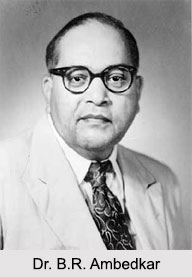 Dr. Bhimrao Ramji Ambedkar was affectionately called "Babasaheb Ambedkar" and had immense contribution in shaping modern India. He led millions of oppressed to a life of self-respect, dignity and responsibility. He had always stressed the importance of better education, so that position of common people in society can be improved. Dr. B.R. Ambedkar was chiefly responsible for drafting of The Constitution of India. He was the first Law Minister of India.
Dr. Bhimrao Ramji Ambedkar was affectionately called "Babasaheb Ambedkar" and had immense contribution in shaping modern India. He led millions of oppressed to a life of self-respect, dignity and responsibility. He had always stressed the importance of better education, so that position of common people in society can be improved. Dr. B.R. Ambedkar was chiefly responsible for drafting of The Constitution of India. He was the first Law Minister of India.
Babasaheb began the revival of Buddhism in India that has grown tremendously after his death, and continues to grow today among his countless followers. He was a veritable phenomenon of the 20th century. He was honoured with the highest national honour, "Bharat Ratna" in April 1990.
Early Life of Dr. B.R. Ambedkar
Dr. Bhimrao Ambedkar was born on April 14, 1891 in the military cantonment of Mhow of Madhya Pradesh. He was the fourteenth child of Ramji Maloji Sakpal and Bhimabai Ambedkar. His family was of Marathi background from the town of Ambavade in the Ratnagiri district of Maharashtra. Dr. B.R. Ambedkar belonged to the Mahar Caste. His father and grandfather served in the British Army. In those days, the government ensured that all the army personnel and their children were educated and ran special schools for this purpose. This ensured good education for Bhimrao Ambedkar. Bhimrao Ambedkar experienced caste discrimination right from the childhood.
In 1907, B.R. Ambedkar passed his matriculation examination and entered the University of Bombay. He became one of the first persons of untouchable origin to enter college in India. The Gaekwad ruler of Baroda (Vadodara) awarded him a scholarship and he studied at universities in the United States, Britain and Germany. He plunged himself in the studies and attained a degree in Master of Arts and a Doctorate in Philosophy from Columbia University in 1916. By 1923 he completed a thesis on "The Problem of the Rupee". He was awarded a D.Sc. by the University of London, and finishing his law studies, he was simultaneously admitted to the British Bar as a barrister. After completing his studies in London, Ambedkar returned to India.
Career of Dr. B.R. Ambedkar
In July 1924, he founded the "Bahishkrit Hitkaraini Sabha", Outcastes Welfare Association with the aim to uplift the downtrodden socially and politically. Dr. B.R. Ambedkar was elected as the chairman of the drafting committee that was constituted by the Constituent Assembly to draft a constitution for independent India. He played a vital role in framing the constitution.
One of the greatest contributions of Dr. B.R. Ambedkar was in respect of Fundamental Rights and Directive Principles of State Policy enshrined in the Constitution of India. The Fundamental Rights provide for freedom, equality and abolition of untouchability, and remedies to ensure the enforcement of rights. The Directive Principles enshrine the broad guiding principles for securing fair distribution of wealth and better living conditions.
Achievements of Dr. B.R. Ambedkar
Dr. B.R. Ambedkar was a man who tried to turn the "Wheel of the Law" toward social justice for all. Dr. B.R. Ambedkar is viewed as messiah of dalits and downtrodden in India. He was the first Law Minister of India who was conferred Bharat Ratna in 1990.
Writings of Dr. B.R. Ambedkar
The canvas of Ambedkar"s writings are vast, and the issues discussed by him in his writings are a modest attempt to mirror the prevailing issues of the Indian society. Ambedkar"s intellectual analysis and insights provide a valuable resource to the students and researchers as well as those engaged in policy making. Ambedkar through his writings has mould opinion in the minds of several Indian. He has brought about a revolution among the Indian society by expressing his views on caste inequality, women empowerment and other socio-political issues.






